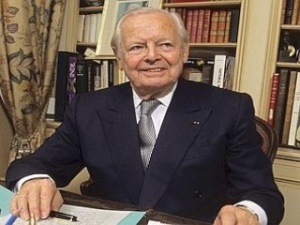Difference between revisions of "Alain Griotteray"
m (Text replacement - "Francois" to "François") |
|||
| Line 6: | Line 6: | ||
|nationality=French | |nationality=French | ||
|image=Alain Griotteray.jpg | |image=Alain Griotteray.jpg | ||
| − | |constitutes=politician | + | |constitutes=politician, businessman, editor, deep state operative? |
|political_party=Republican Party (France) | |political_party=Republican Party (France) | ||
|wikipedia=https://fr.wikipedia.org/wiki/Alain_Griotteray | |wikipedia=https://fr.wikipedia.org/wiki/Alain_Griotteray | ||
| Line 27: | Line 27: | ||
Under the presidency of [[Valery Giscard d'Estaing]], Alain Griotteray was responsible for investitures of the [[French Republican Party]]. In this capacity, he participated in the founding of the [[Union for French Democracy]] in 1978, and contributed to the rise of a new generation of politicians whose [[Alain Madelin]], [[ Charles Millon]], [[Gerard Longuet]] and [[François Leotard]]. | Under the presidency of [[Valery Giscard d'Estaing]], Alain Griotteray was responsible for investitures of the [[French Republican Party]]. In this capacity, he participated in the founding of the [[Union for French Democracy]] in 1978, and contributed to the rise of a new generation of politicians whose [[Alain Madelin]], [[ Charles Millon]], [[Gerard Longuet]] and [[François Leotard]]. | ||
| − | In [[1978]] with [[Louis Pauwels]], he founded [[Le Figaro Magazine]] of which he was deputy director and editor. His editorials supported liberalism, very conservative and very Eurosceptic. He was the first foreign journalist to interview [[Ronald Reagan]]. He eventually come into conflict with the new editorial director of the newspaper [[Patrick de Carolis]]. He graduated in [[2001]], along with other supporters of liberalism in the US as [[Thierry Desjardins]] and [[Jean-Jacques Rosa]]. | + | In [[1978]] with [[Louis Pauwels]], he founded [[Le Figaro Magazine]] of which he was deputy director and [[editor]]. His editorials supported liberalism, very conservative and very Eurosceptic. He was the first foreign journalist to interview [[Ronald Reagan]]. He eventually come into conflict with the new editorial director of the newspaper [[Patrick de Carolis]]. He graduated in [[2001]], along with other supporters of liberalism in the US as [[Thierry Desjardins]] and [[Jean-Jacques Rosa]]. |
In 1984 he co-founded of [[Solidarite Liberte]] with fellow Cercle participants [[Raymond Bourgine]], [[Charles Pasqua]] and a number of others. | In 1984 he co-founded of [[Solidarite Liberte]] with fellow Cercle participants [[Raymond Bourgine]], [[Charles Pasqua]] and a number of others. | ||
Revision as of 17:24, 23 June 2019
(politician, businessman, editor, deep state operative?) | |
|---|---|
 | |
| Born | 15 October 1922 Paris, France |
| Died | 30 August 2008 (Age 85) |
| Nationality | French |
| Member of | Le Cercle |
Alain Griotteray was a leader of the French Resistance who worked as a journalist, politician and entrepreneur in France. He was co-founder of the UDF, deputy mayor of Charenton-le-Pont.
World War II
In 1943, he became the youngest leader in the French resistance.[1]
Politician
In 1973 he was made mayor of Charenton-le-Pont.[2]
Under the presidency of Valery Giscard d'Estaing, Alain Griotteray was responsible for investitures of the French Republican Party. In this capacity, he participated in the founding of the Union for French Democracy in 1978, and contributed to the rise of a new generation of politicians whose Alain Madelin, Charles Millon, Gerard Longuet and François Leotard.
In 1978 with Louis Pauwels, he founded Le Figaro Magazine of which he was deputy director and editor. His editorials supported liberalism, very conservative and very Eurosceptic. He was the first foreign journalist to interview Ronald Reagan. He eventually come into conflict with the new editorial director of the newspaper Patrick de Carolis. He graduated in 2001, along with other supporters of liberalism in the US as Thierry Desjardins and Jean-Jacques Rosa.
In 1984 he co-founded of Solidarite Liberte with fellow Cercle participants Raymond Bourgine, Charles Pasqua and a number of others.
Connections
In 1985 he attended a meeting of Le Cercle.